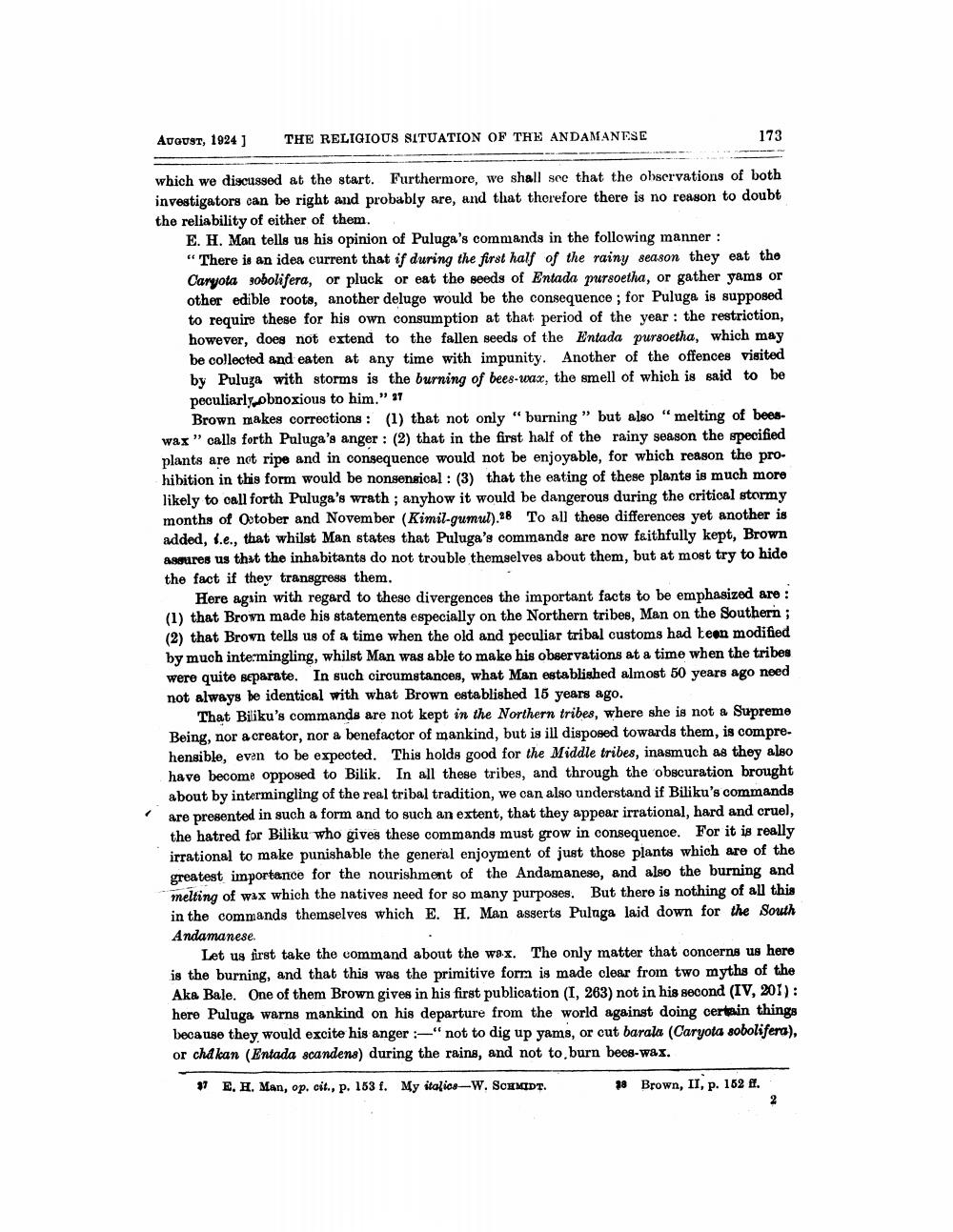________________
August, 1924 ]
THE RELIGIOUS SITUATION OF THE ANDAMANESE
173
which we discussed at the start. Furthermore, we shall see that the observations of both investigators can be right and probably are, and that therefore there is no reason to doubt the reliability of either of them.
E. H. Man tells us his opinion of Puluga's commands in the following manner : "There is an idea current that if during the first half of the rainy season they eat the Caryota sobolifera, or pluck or eat the seeds of Entada persoetha, or gather yams or other edible roots, another deluge would be the consequence ; for Puluga is supposed to require these for his own consumption at that period of the year : the restriction, however, does not extend to the fallen seeds of the Entada pursoetha, which may be collected and eaten at any time with impunity. Another of the offences visited by Puluga with storms is the burning of bees-wax, the smell of which is said to be peculiarly obnoxious to him." 31
Brown makes corrections: (1) that not only "burning" but also "melting of beeswax” calls forth Puluga's anger : (2) that in the first half of the rainy season the specified plants are not ripe and in consequence would not be enjoyable, for which reason the prohibition in this form would be nonsensical : (3) that the eating of these plants is much more likely to call forth Puluga's wrath ; anyhow it would be dangerous during the critical stormy months of October and November (Kimil-gumul).28 To all these differences yet another is added, t.e., that whilst Man states that Puluga's commands are now faithfully kept, Brown assures us that the inhabitants do not trouble themselves about them, but at most try to hide the fact if they transgress them.
Here agrin with regard to these divergences the important facts to be emphasized are: (1) that Brown made his statements especially on the Northern tribes, Man on the Southern; (2) that Brown tells us of a time when the old and peculiar tribal customs had been modified by much inte mingling, whilst Man was able to make his observations at a time when the tribes were quite separate. In such circumstances, what Man established almost 50 years ago need not always be identical with what Brown established 15 years ago.
That Biliku's commands are not kept in the Northern tribes, where she is not a Supreme Being, nor a creator, nor a benefactor of mankind, but is ill disposed towards them, is comprehensible, even to be expected. This holds good for the Middle tribes, inasmuch as they also have become opposed to Bilik. In all these tribes, and through the obscuration brought about by intermingling of the real tribal tradition, we can also understand if Biliku's commands are presented in such a form and to such an extent, that they appear irrational, hard and cruel, the hatred for Biliku who gives these commands must grow in consequence. For it is really irrational to make punishable the general enjoyment of just those plants which are of the greatest importance for the nourishment of the Andamanese, and also the burning and melting of wax which the natives need for so many purposes. But there is nothing of all this in the commands themselves which E. H. Man asserts Pulaga laid down for the South Andamanese
Let us first take the command about the wax. The only matter that concerns us here is the burning, and that this was the primitive form is made clear from two myths of the Aka Bale. One of them Brown gives in his first publication (I, 263) not in his second (IV, 201): here Puluga warns mankind on his departure from the world against doing certain things because they would excite his anger :-"not to dig up yams, or cut barala (Caryota sobolifera), or cha kan (Entada scandens) during the rains, and not to burn bees-wax.
37 E. H. Man, op. cit., p. 153 f. My italics-W. SCHMIDT.
98 Brown, II, p. 162 ft.




